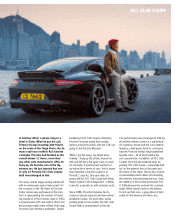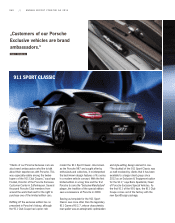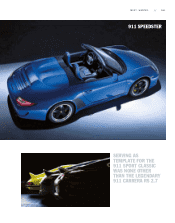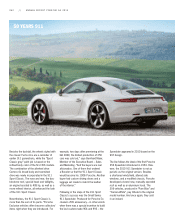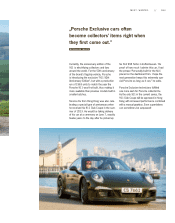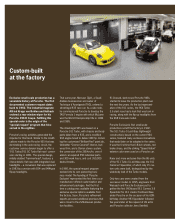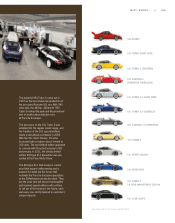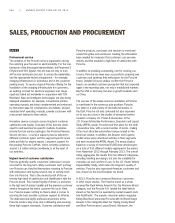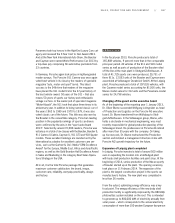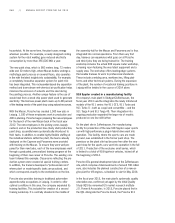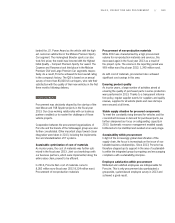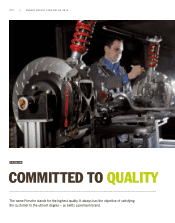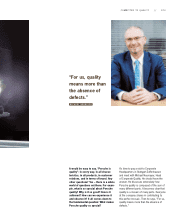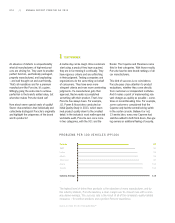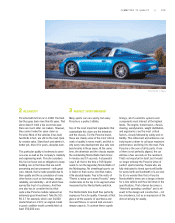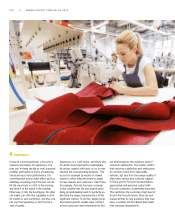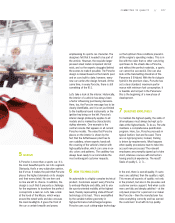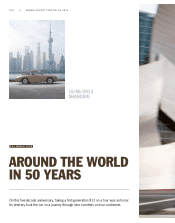Porsche 2013 Annual Report Download - page 71
Download and view the complete annual report
Please find page 71 of the 2013 Porsche annual report below. You can navigate through the pages in the report by either clicking on the pages listed below, or by using the keyword search tool below to find specific information within the annual report.
landed the J.D. Power Award as the vehicle with the high-
est customer satisfaction in the Midsize Premium Sporty
Car segment. The mid-engined Boxster sports car also
took first prize; the model was honored with the Highest
Initial Quality – Compact Premium Sporty Car award. The
Cayenne and Panamera took third place in the Midsize
Premium CUV and Large Premium Car segments respec-
tively. As a result, Porsche achieved its best overall rating
in the company’s history. The IQS is based on an annual
survey of more than 83,000 US car buyers, who rate their
satisfaction with the quality of their new vehicles in the first
three months following delivery.
PROCUREMENT
Procurement was decisively shaped by the start-up of the
new Macan and 918 Spyder projects in the fiscal year
2013. Our close working relationship with our business
partners enabled us to master the challenges of these
vehicle projects.
Cooperation between the procurement organizations of
Porsche and the brands of the Volkswagen group was also
further consolidated. Other important steps toward closer
integration were taken in 2013, including the implementa-
tion and standardization of IT systems.
Sustainable optimization of cost of materials
As in prior years, the cost of materials was further opti-
mized in the fiscal year 2013. Joint cost workshops with
our business partners, which were implemented along the
entire value chain, proved to be efficient.
In 2013, Porsche AG’s cost of materials came to
8,282 million euro (fiscal year 2012 8,124 million euro).
Procurement of non-production materials
Procurement of non-production materials
While 2012 was characterized by a high procurement
volume for non-production materials and services, this
decreased again in the fiscal year 2013 as a result of
the project cycle. The volume in the reporting period was
969 million euro (fiscal year 2012: 1,240 million euro).
As with cost of materials, procurement also achieved
significant cost savings in this area.
Ensuring product quality
As in prior years, a large number of activities aimed at
ensuring the quality of purchased parts in series production
were performed in 2013. Thanks to a transparent informa-
tion policy, regular supplier events for suppliers and quality
reviews, supplies for all vehicle plants and new start-ups
were ensured at all times.
Stable supply situation for procured components
To meet the constantly rising demand for vehicles and the
concomitant increase in demand for purchased parts, we
further sharpened our focus on safeguarding capacity in
2013. Systematic resource management enabled supply
bottlenecks to be identified and avoided at an early stage.
Sustainability within procurement
In light of the increasingly global diversification of the
supply chain, the focus is increasingly on the issue of sus-
tainable business relationships. Since 2013, Porsche has
therefore stepped up its support in the area of sustainabili-
ty within the integrated group by requiring and encouraging
compliance with sustainability principles.
Employee satisfaction within procurement
Motivated and satisfied employees are indispensable for
Porsche. This is why procurement also participated a
group-wide, system-based employee survey in 2013 and
achieved a good result.
SALES, PRODUCTION AND PROCUREMENT // 069


